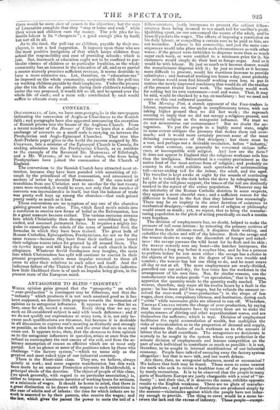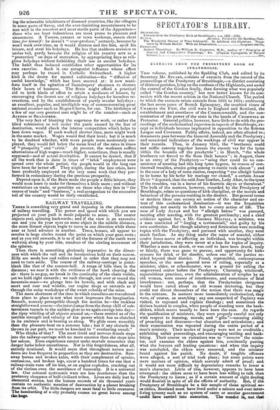ANTAGONISM TO BLIND "INDUSTRY."
WHILE opinion gains ground that the " prosperity " on which "over-production" is contingent may be fallacious, and that the " industry " which produces it is not such unmixed good as it has been supposed, we discern little progress towards the formation of opinion as to antagonist influences. It appears to us—But let us here, once for all, record a caveat. Every thing that we say on such an ill-considered subject is said sith much deference; and if we do not qualify our expressions at every turn, it is, not only be- cause such qualifications are tiresome, but because it is desirable in all discussion to express one's meaning as distinctly and strongly as possible, so that both the truth and the error that are in us may come out. It appears to us, then, that the slowness to form opinion as to the antagonist influences in question, arises at once from the refusal to contemplate the real causes of the evil, and from the ar- bitrary assumption of causes as efficient which are at most only partial. Let us glance at some of the positions taken by those who challenge "the factory system,"—which we name only as the greatest and most naked type of our industrial economy. There is the Short-time class. They are, we believe, always quietly at work; and some cognate manifestation has this week been made by an amateur Protection advocate in Huddersfield, a principal abode of the doctrine. The object of people of this class, (Tie speak generally, with regard to no particular association,) is, either to impose a maximum duration of working hours for artisans, or a minimum of wages. It should be borne in mind, that there is a great distinction to be drawn with respect to such restrictions in the case of adults and of infants: the time for which infants are to work is assented to by their parents, who receive the wages ; and the law, which gives the parent the power to mete the toil of a fellow-creature, justly interposes to prevent the subject fellow- creature from being doomed to too much toil for another's profit. Quibbling apart, no one can compel the assent of the adult, and he himself pockets the wages. The effects of imposing a restriction on his daily labour, or compelling a certain sum to be paid to him, are not recondite. Labour is his commodity, and just the same con- sequences would take place under such circumstances as with other wares : if the grocer were forbidden to dispense more than so much sugar each week, or were entitled to a minimum price for it, his cnstomers would simply do their best to forego sugar. And so it would be with labour. By just so much as it became dearer, would the manufacturer dispense with it ; by just so much as it became more difficult to procure, would his exertions increase to provide substitutes ; and instead of working ten hours a day, most probably the artisan would soon find himself working even less, to put in motion the newly-improved machinery that would do all the residue of the present twelve hours' work. The machinery would work for nothing but its own sustenance—coal and water. That, it may be said, would be checked by a tax on machinery : but we need not enter on this vast collateral Question.
The Mornihg Post, a stanch opponent of the Free-traders in labour, reproaches us, though in complimentary terms, with not taking higher ground than we did last week ; the reproach seeming to imply that we did not occupy a religious ground, and recommend religion as the antagonist influence. We trust we do not misconstrue our commentator ? But we doubt the an- tagonism. To put the people in a highly moral state might to some extent mitigate the pressure that makes them toil over- much; and it would more certainly prevent some of the most debasing consequences of that drudgery : but there must be a vast, and perhaps not a desirable revolution, before "industry,' even when extreme, can generally be esteemed vicious influ- ence, or incompatible with religion. And how are the facts ? It does not appear in England that the religious workman toils less than the irreligious. Switzerland is a country preeminent as the native land of the most serious form of religion; and probably no country in the world exhibits such spectacles of unintermitting toil—never-ending toil for the infant, the adult, and the aged. The traveller is kept awake at night by the sounds of continuing toil ; he is waked in the dark before the dawn by rebeginning toil. In spite of the religious support, the traces of the toil are distinctly marked in the aspect of the entire population. Whatever may be the inferiority of the Roman Catholic districts in some respects, they appear a more cheerful race and a sufficient reason for the difference is found in the fact that they labour less unceasingly. T here may be an impiety in the utter devotion of existence to mechanical drudgery,—almost any creed of religion or philosophy would assert as much ; yet, we repeat, that to bring the manufac- turing population to the pitch of acting practically on such a maxim were hopeless.
The division of employments has, no doubt, helped to make the pressure of toil more intense: by removing the primary motives Of labour from their ultimate result, it disguises their working, and enfeebles the choice and will of the labourer. Both the savage and the weaver desire to escape the discomfort of hunger and naked- ness: the savage pursues the wild beast for its flesh and its skin ; the weaver scarcely sees any beast—the butcher interposes, the skin travels a long way before it reaches him, and he has a process to perform before he can meet either : the savage has a choice in the objects of his pursuit, in the degree of his own trouble and comfort ; the weaver has but one thing to do, and he must weave all day or not at all. The more employments are ready-divided, parcelled out cut-and-dry, the less voice has the workman in the arrangement of his own time. Nor, for similar reasons, can the manufacturer who makes goods "on speculation," that is by guess, apportion the quantity made to the quantity really needed. The weaver, therefore, may waste all his twelve hours by a fault in the guess : he has been paid his wages, but he refunds the amount re- ceived for over-work ("over-production") in the shape of low wages, short time, compulsory idleness, and destitution, during each " crisis " while successive gluts are allowed to run off. Wherefore, Thomas CARLYLE retorts the charge of over-production, by saying that these over-producers have by society been set to make the surplus masses of shining and other superabundant wares, and are themselves the sufferers; which is true. Division of employment facilitates the rapid accumulation of wealth, but multiplies the risks of miscalculation as to the proportion of demand and supply, and weakens the choice of each workman as to the amount of
labour that he shall contribute. The antagonism we desiderate is scarcely to be sought in the system whose very perfection is the
minute division of employments and intense competition on the part of each individual to contribute as much as possible: it is not, therefore, to be sought in internal modifications of our inclustrikl economy. People have talked of sweeping away the factory system altogether : but that is mere talk, and not worth debate.
Are there, then, no antagonist influences, moral or economical ? We believe that both may be found. Those seem to come nearest the mark who seek to revive a healthier tone of the popular mind by manly recreations. It is to be observed that the people in many parts of Southern Europe are justly chargeable with a want of" in- dustry " ; and their vice, if it deserves the name, exhibits opposite results to the English weakness. There are no gluts of manufac- turing plethora ; and periods of destitution are produced simply by the seasons—vicissitudes against which the people have not indus- try enough to provide. The thing to covet would be a mean be- tween the lack and the excess of industry. Those people—except- bag the miserable inhabitants of diseased countries, like the villagers in some parts of Savoy, and the ever-famishing mountaineers to be met with in the remotest and most sterile parts of the Appenines- those who are least industrious are most prone to pleasure and amusement. A Tuscan, peasant or town workman, enacts short time for himself: he doesn't "over-produce," certainly, because he won't work over-time, as it would distress and tire him, spoil his leisure, and steal his holydays. He has that stubborn aversion to undue toil, partly because the religion of his country acts as a "protection " on days of recreation, by appropriating days as reli- gious holydays without forbidding their use as secular holydays. The habit thus induced establishes other opportunities for its own exercise. Such is one antagonist influence whose effect may perhaps be traced in Catholic Switzerland. A higher kind IR the desire for mental cultivation—the "diffusion of useful knowledge," which has been sneered at : it now mani- fests itself in the agitation of linendrapers' shopmen to shorten their hours of business. The State might afford a practical aid to both kinds of effort to attain a modicum of leisure, by encouraging the decent use of religious bolydays for harmless re- creations, and by the establishment of purely secular holydays ; an excellent, popular, and intelligible way of commemorating great national events— such as Magna Charts, for one. The birthdays of a few of our very greatest men might be of the number—such as ALFRED or SHARSPERE.
The very fact of blunting the eagerness for work, or rather the blind submission to toil under the panic caused by the fear of destitution, would check the intense competition which helps to heat down wages. If each worked shorter time, more might work in the same market. Wages would find their level ; but it is much to be doubted whether, with more people more moderately em- ployed, they would fall below the mean level of the rates in times of " prosperity " and "crisis." At present, the workmen suffers alternations of high wages—much higher, sometimes, than is usually supposed—and of actual destitution. It cannot be denied, that if all the work that is done in times of "brisk" employment were spread over the whole period, the people would in the long run have been far better off. They might, during the late crisis, have been profitably employed on the very same work that they per- formed in redundancy during the previous prosperity. Depend upon it, if the State made the people a little leisure, they would soon learn to make for themselves a little more ; and without restrictions on trade, or penalties on those who obey fate in "the course of trade" and "business," a real antagonism to the excessive toil of the country would be fairly established.



























 Previous page
Previous page